 Some analysts are warning that the Obama administration is taking the wrong approach in moving to increase US military support for the nascent Somalia’s government.
Some analysts are warning that the Obama administration is taking the wrong approach in moving to increase US military support for the nascent Somalia’s government.
Secretary of State Hillary Clinton said in Nairobi on Thursday following a meeting with TFG leader Sheik Sharif Sheik Ahmed that she and President Obama “want to expand and extend our supportâ€. Other officials indicate that the US plans to double the 40 tonnes of weaponry it has been supplying to TFG forces via other African states, mainly Uganda.
“US support for the TFG is nothing short of disastrous, so we’ve just doubled disaster,†says Prof Peter Pham, an Africa specialist who has testified in the US Senate on Somalia policy.
Pham charges that some of the small arms intended for the TFG have ended up in markets in Mogadishu – and ultimately in the hands of Al-Shabaab, an Islamist militia – due to corruption along the supply chain. “We’ve saved the Shabaab the trouble of having to run past the UN arms embargo,†Pham says.
The biggest concern that Mrs Clinton raised with the Kenyan team was about Somalia and the threat of extremism posed by Al Shabab. Though she brought no firm proposals, Mrs Clinton wanted assurances that the Kenya government will continue to remain vigilant against the Islamists.
Already, there have been reports of the US facilitating some arms shipments to the weak interim government in Somalia. America is also a key funder of the Africa Union peacekeeping contingent in Mogadishu; in the last two years the Americans have spent $150 million to support the peacekeeping force.
There was no overt suggestion on Mrs Clinton’s part that Kenya takes a military role. The subsequent meeting with Somali interim President Sheikh Shariff Ahmed was deliberately arranged as a demonstration of US support.
A senior State Department official told reporters in Washington in June that the US has so far spent something less than $10 million on arms and training for the TFG. Weapons and ammunition are given to the TFG by the Ugandan forces stationed in Somalia as part of a UN-African Union deployment, with the US then reimbursing Uganda for the cost of the arms, the official explained.
Ugandans and Burundians, who together account for the 4300 UN-AU troops in Somalia, have also been training TFG troops, with Washington again paying the cost of those operations. Some training is apparently taking place at the US military base in Djibouti. “The Kenyans are also prepared to provide training,†the State Department official said in a June 25 briefing.
The Obama administration is acting wisely in relying on third parties to assist the TFG, says Daniel Volman, director of the US-based African Security Research Project. Key State Department officials “understand that any kind of direct linkage with the US will stigmatise the TFG as an agent of US policy.â€
But Volman expresses scepticism about the move to increase even indirect US military support for the TFG. Training efforts, for example, will yield no short-term benefits for the embattled Somalia government, he notes “It takes months for troops to get prepared,†Volman says.
President Ahmed’s forces may no longer be on the verge of defeat, however. Volman characterises the TFG’s face-off with Al-Shabaab in Mogadishu as currently a stalemate. And an unnamed US government analyst is quoted in Friday’s Washington Post as suggesting that Al-Shabaab is losing public support in other parts of Somalia.
Source: Daily Nation
By KEVIN KELLY in New York and GITAU WARIGI in Nairobi






